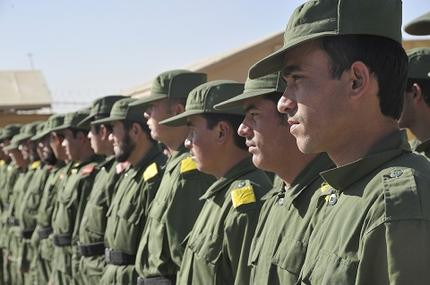Reporting Afghanistan
War Veteran Draws Comparisons Between The Soviet Union and Canada
Shortly after Nikolai Lanine immigrated to Canada in 2000, he again found himself a citizen of a country that was waging war on a place he left over 12 years ago.
At 18-years-old, Lanine was drafted into the Soviet army. He served in Afghanistan for 16 months until the Soviets withdrew in February of 1989—just over nine years after the war began.
Read the full interview here.
As Canada and NATO’s war in Afghanistan progressed, the stories Lanine was reading and hearing started to sound familiar. The tone and language of the media and government rhetoric was not so different from what he had heard in the USSR.
The similarities shocked Lanine. He wanted to know if what he saw as parallels were really true. The Soviet war veteran began to study the coverage of the respective wars by Western and Soviet journalists. He did side-by-side comparisons with what was coming from Canadian and Western media. The results were startlingly similar and revealed how a country at war views itself.
Lanine now lives in Victoria, B.C., and works as a public health nurse. He shared his media criticism with The Link.
The Link: Canada’s stated objectives for its Afghanistan mission include security, humanitarian assistance and reconciliation. Can you compare those to Russia’s objectives during the Soviet-Afghan war?
Nikolai Lanine: The Soviet Union and Canada’s claimed objectives are similar, although there are some differences mainly due to the different international situations of the Cold War and today.
Canadians were told we’re in Afghanistan because of “self-defence” and because “helping Afghanistan will protect Canada.” The USSR claimed that by sending troops to Afghanistan it was preventing a “threat to the security of [the Soviet] southern borders” from Islamic fundamentalists.
The USSR claimed it was protecting the security of Afghanistan itself from external interference from Pakistan and Iran. Currently, Canada/NATO claims that improving security in Afghanistan will prevent the country from becoming a safe haven for terrorists. The Taliban is often portrayed as a foreign proxy force that is invading Afghanistan from Pakistan. This is similar to how the Soviet media described the situation in Afghanistan: US and Pakistani-trained Islamists crossing into Afghanistan and threatened its security. The Soviet goal was “to prevent the establishment of… a terrorist regime and to protect the Afghan people from genocide,” and also to provide “aid in stabilizing the situation and the repulsion of possible external aggression.”
The Link: According to your research there are similarities between the Western media’s coverage of the war and the Soviet media’s coverage. Can you explain your comparison and say why you think a free press can come to resemble a state-controlled one?
Lanine: I was not comparing the freedom of the press. I focused on the framework and outcomes of media coverage. I was simply looking at what the media covered and how it covered it.
I looked at how much the media focused on positive stories of Soviet soldiers versus negative stories on insurgency, or how often and why the media was critical of the Soviet role in Afghanistan. What I found was that Soviet coverage of the last years of war was comparable to that of Canadian coverage in 2006-07. There are differences, of course: for example, the Soviets didn’t report casualties in the beginning at all and even, at the height of the media’s freedom, coverage of Soviet casualties was not as complete as Canadian coverage now.
Another example, Canadian media does mention Afghans killed by us, although rather superficially, while Soviets didn’t mention them until the end of war. However, the overall framework of coverage is very similar: we are doing the right thing by fighting in Afghanistan for our own security and a better future for Afghans, with media focusing heavily on our military and reconstruction. […]
The West justifiably ridiculed the Soviet media for not challenging the Soviet government, for presenting a one-sided picture of war and leaving out the narrative of Afghans. With few exceptions, I don’t see Canadian media doing a much better job now.
The Link: In a previous interview you said that the Soviet Union got caught up in the “idea of [its] own goodness” and that you were surprised to see the same thing happening in Canada? Can you explain what you meant by that?
Lanine: Like Canadians today, Soviets believed that they went to Afghanistan out of good intentions to help Afghans to get rid of an oppressive regime and Islamic fundamentalists and to provide Afghans with a better future. Once we believe this self-created narrative, we start seeing war through the prism of self-righteousness, and our actions as unquestionably good. We see ourselves as a positive force doing the right thing and making big sacrifices for the benefit of others—Afghans. We collectively fall in love with this righteous self-image, celebrate ourselves and don’t stop to examine our actions.
When Soviets were talking about the cost of war, it usually implied losses by Soviet and Afghan troops. The focus of the Soviet media and public were on the Soviet blood and sacrifices, not Afghan ones. These attitudes are not that different in Canada today.
This article originally appeared in Volume 31, Issue 24, published March 7, 2011.


